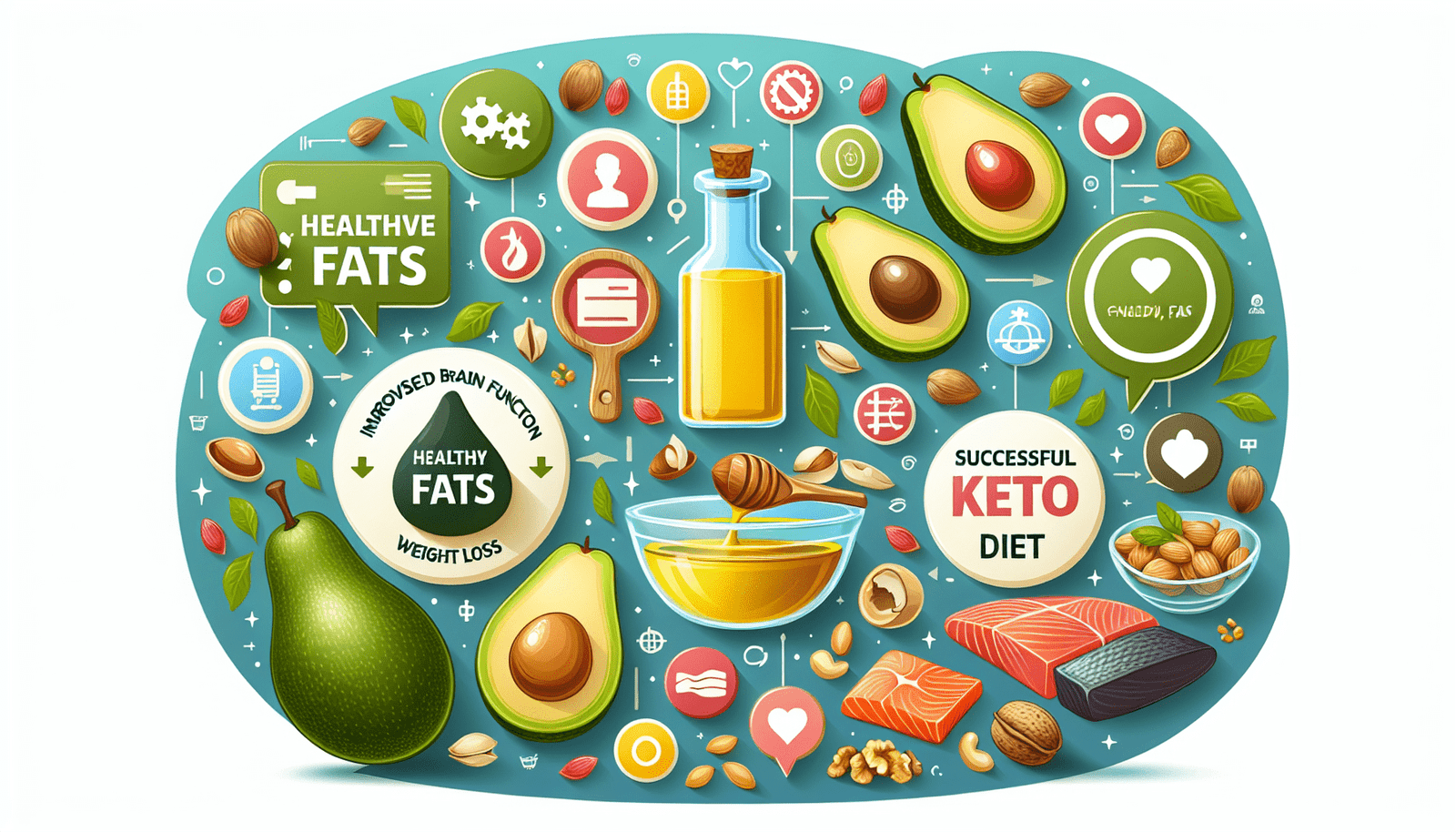Are you considering starting a Keto diet and want to know more about incorporating healthy fats into your meals? Look no further! In this comprehensive guide, you will learn everything you need to know about healthy fats and how they play a crucial role in a successful Keto journey. From the benefits they offer to the best sources to incorporate into your daily meals, this guide will equip you with the knowledge to make informed choices and achieve your health and wellness goals with ease. Get ready to unlock the power of healthy fats and take your Keto diet to the next level!

Benefits of Healthy Fats in a Keto Diet
A ketogenic diet, or “keto” diet, is a low-carb, high-fat diet that has gained popularity for its potential weight-loss benefits. While it may seem counterintuitive to consume high amounts of fat to lose weight, incorporating healthy fats into your ketogenic diet can actually be advantageous. Let’s explore the key benefits of healthy fats in a keto diet.
Promotes Weight Loss
Contrary to popular belief, not all fats are created equal. Healthy fats, such as monounsaturated and polyunsaturated fats, can actually aid in weight loss when consumed in moderation. These fats help keep you feeling satiated, preventing overeating and reducing cravings for unhealthy, high-sugar foods. Additionally, incorporating healthy fats in your diet can increase your metabolic rate, allowing your body to burn fat more efficiently.
Provides Sustained Energy
One major advantage of including healthy fats in your keto diet is that they provide a source of sustained energy. When you limit your carbohydrate intake, your body turns to fat as its primary source of fuel, a process known as ketosis. Healthy fats help fuel your body and mind, keeping you energized throughout the day.
Enhances Brain Function
Did you know that your brain is mostly made up of fat? By including healthy fats in your keto diet, you support optimal brain function. Healthy fats, such as omega-3 fatty acids found in fatty fish, flaxseeds, and walnuts, have been shown to reduce inflammation in the brain and support cognitive function, memory, and overall brain health.
Reduces Inflammation
Inflammation is the body’s natural response to injury or infection, but chronic inflammation can contribute to various health issues. Healthy fats, especially those high in monounsaturated and polyunsaturated fats, have anti-inflammatory properties that can reduce inflammation in the body. By incorporating these fats into your diet, you may experience a decrease in inflammation and related symptoms, such as joint pain and digestive issues.
Types of Healthy Fats
Not all fats are created equal, and it’s important to understand the different types of healthy fats to make informed choices for your keto diet. Let’s delve into the various types of healthy fats you can incorporate into your meals.
Monounsaturated Fats
Monounsaturated fats are considered heart-healthy fats that can improve blood cholesterol levels and reduce the risk of heart disease. They are liquid at room temperature and solidify when refrigerated. Some excellent sources of monounsaturated fats include avocados, olive oil, nuts, and seeds.
Polyunsaturated Fats
Polyunsaturated fats are essential fats that your body needs but cannot produce on its own. These fats play a crucial role in brain function, cell growth, and reducing inflammation. Fatty fish, such as salmon and tuna, flaxseeds, chia seeds, and walnuts, are excellent sources of polyunsaturated fats.
Saturated Fats
Saturated fats have been a topic of debate in the world of nutrition, but recent research suggests that they may not be as harmful as once believed. Some saturated fats, such as those found in coconut oil and grass-fed butter, can be beneficial when consumed in moderation. Other sources include eggs and full-fat dairy products.
Trans Fats
Trans fats are artificial fats created through a process called hydrogenation. These fats are known to have detrimental effects on health, raising the risk of heart disease and inflammation. It is best to avoid trans fats completely, as they offer no nutritional benefits. Common sources of trans fats include processed and fried foods, vegetable and seed oils, and highly processed meats.
Best Food Sources of Monounsaturated Fats
Now that we understand the importance of consuming monounsaturated fats, let’s explore some of the best food sources to incorporate into your keto diet.
Avocado
Avocados are not only delicious but also an excellent source of monounsaturated fats. They are packed with essential nutrients, including fiber, potassium, vitamin K, and vitamin E. Adding slices of avocado to your salads or using avocado oil for cooking can boost your monounsaturated fat intake.
Olive Oil
Olive oil is well-known for its health benefits and is a staple in Mediterranean cuisine. It is rich in monounsaturated fats, antioxidants, and anti-inflammatory properties. Use extra virgin olive oil as a dressing for your salads or to sauté vegetables to increase your monounsaturated fat intake.
Nuts and Seeds
Nuts and seeds offer a convenient and delicious way to incorporate monounsaturated fats into your diet. Almonds, cashews, pecans, and macadamia nuts are all high in monounsaturated fats. Additionally, chia seeds and flaxseeds are fantastic sources of healthy fats, including omega-3 fatty acids.
Natural Nut Butters
Another great way to enjoy monounsaturated fats is through natural nut butters made from almonds, cashews, or peanuts. These spreads can be used as a topping, added to smoothies, or enjoyed with fresh fruit for a nutritious and flavorful snack.
Best Food Sources of Polyunsaturated Fats
Polyunsaturated fats, particularly omega-3 fatty acids, play a vital role in many aspects of health. Let’s explore some of the best food sources of polyunsaturated fats for your keto diet.
Fatty Fish (Salmon, Tuna)
Fatty fish, such as salmon and tuna, are an excellent source of omega-3 fatty acids. These healthy fats have been associated with numerous health benefits, including reducing inflammation, improving heart health, and supporting brain function. Incorporating fatty fish into your weekly meal plan can provide a significant boost of polyunsaturated fats.
Flaxseeds
Flaxseeds are a versatile and nutritious addition to your keto diet. They are rich in omega-3 fatty acids, fiber, and antioxidants. Grinding flaxseeds and adding them to smoothies, yogurt, or baked goods can help increase your polyunsaturated fat intake.
Chia Seeds
Chia seeds are small but mighty when it comes to their nutritional value. They are high in omega-3 fatty acids, fiber, protein, and various minerals. Soaking chia seeds in liquid, such as almond milk, creates a gel-like consistency that can be used in puddings, added to yogurt, or sprinkled on top of salads.
Walnuts
Walnuts are not only a tasty snack but also a great source of omega-3 fatty acids. They can be enjoyed on their own or added to salads, oatmeal, or baked goods. Including walnuts in your diet can provide you with a healthy dose of polyunsaturated fats.

Best Food Sources of Saturated Fats
While saturated fats have been somewhat controversial in the past, recent research has shown that they can be part of a healthy diet when consumed in moderation. Let’s explore some of the best food sources of saturated fats to include in your keto diet.
Coconut Oil
Coconut oil is a popular choice among ketogenic dieters due to its high content of saturated fats, specifically medium-chain triglycerides (MCTs). MCTs are easily absorbed and converted into energy, making coconut oil an excellent choice for fueling your body on a keto diet. Use coconut oil for cooking, baking, or adding to your morning coffee to increase your saturated fat intake.
Grass-Fed Butter
Grass-fed butter is a rich source of vitamins, minerals, and saturated fats. Unlike conventional butter, which is made from grain-fed cows, grass-fed butter contains higher concentrations of omega-3 fatty acids and conjugated linoleic acid (CLA). Incorporating grass-fed butter into your keto diet can provide a boost of flavor and healthy fats.
Eggs
Eggs are nutrient-dense and a source of complete protein, making them an ideal food for a keto diet. The yolk of an egg is where the majority of the saturated fats are found, along with essential nutrients like choline, which is important for brain health. Enjoying eggs in various forms, such as scrambled, boiled, or in omelets, can provide you with a good dose of healthy fats.
Full-Fat Dairy Products
Full-fat dairy products, such as cheese, yogurt, and heavy cream, can be enjoyed in moderation on a keto diet. These foods are rich in saturated fats and provide important nutrients like calcium and vitamin D. Opt for quality, grass-fed dairy products for the highest nutritional value.
Foods to Avoid or Limit
While it’s essential to incorporate healthy fats into your keto diet, it’s equally important to avoid or limit certain foods that are not conducive to overall health. Let’s explore the foods you should steer clear of or consume in moderation.
Processed and Fried Foods
Processed and fried foods are often high in unhealthy fats, such as trans fats and unhealthy vegetable oils. To maintain a healthy ketogenic lifestyle, it’s best to avoid or limit these foods as much as possible. Instead, focus on whole, unprocessed foods that provide essential nutrients and healthy fats.
Vegetable and Seed Oils
Vegetable and seed oils, such as soybean oil, corn oil, and sunflower oil, are commonly used in processed foods and cooking. These oils are high in omega-6 fatty acids, which, when consumed in excess, can promote inflammation in the body. Opt for healthier alternatives, such as olive oil or avocado oil, for cooking and dressing.
Highly Processed Meats
Highly processed meats, such as deli meats and sausages, often contain unhealthy additives and preservatives. Additionally, these meats can be high in unhealthy fats and sodium. If you choose to include these foods in your keto diet, opt for minimally processed or organic options without added sugars or unhealthy additives.
Trans Fat Sources
Trans fats are artificial fats that can harm your health and increase the risk of heart disease. They are commonly found in fried foods, processed snacks, and baked goods. Always check food labels and avoid products that contain hydrogenated or partially hydrogenated oils.

Healthy Fats Cooking Tips
Now that you have a good understanding of the different types of healthy fats and their food sources, let’s explore some tips for using these fats in your cooking to enhance both flavor and nutritional value.
Cook with Stable and High Smoke Point Oils
When cooking at high temperatures, it’s important to use oils with stable and high smoke points to prevent the production of harmful compounds. Avocado oil, coconut oil, and ghee (clarified butter) are excellent choices for sautéing, stir-frying, or roasting.
Use Natural Fats for Flavor Enhancement
Instead of relying solely on unhealthy processed sauces or dressings, incorporate natural fats to enhance the flavor of your dishes. Drizzle olive oil or sprinkle some chopped nuts and seeds on top of salads, soups, or roasted vegetables for a delicious and nutritious twist.
Incorporate Healthy Fats in Every Meal
To ensure you’re getting an adequate amount of healthy fats, make it a point to include them in every meal. Add avocado slices or a dollop of full-fat yogurt to your breakfast, drizzle olive oil on your lunchtime salad, and cook your dinner with coconut oil or grass-fed butter.
Experiment with Different Fats and Flavors
Don’t be afraid to experiment with different types of healthy fats to diversify your flavor profiles. Try using avocado oil in salad dressings, macadamia nut oil as a marinade, or sesame oil for stir-frying. Mixing and matching healthy fats can not only enhance the taste of your meals but also provide a variety of nutrients.
Recommended Daily Intake of Healthy Fats
While a keto diet is typically higher in fats, it’s important to strike a balance between fat, protein, and carbohydrate intake to meet your individual needs and goals. Here are some guidelines for calculating your fat macros and ensuring you consume healthy fats in appropriate quantities.
Calculating Fat Macros for a Keto Diet
To calculate your fat macros for a keto diet, you should aim for approximately 70-75% of your daily calorie intake to come from healthy fats. This percentage may vary depending on individual goals and preferences. It’s best to consult with a healthcare professional or registered dietitian to determine your specific macronutrient needs.
Avoiding Excessive Fat Consumption
While fats are an essential part of a keto diet, it’s important not to overconsume them. Excessive fat intake can lead to weight gain and hinder your weight loss goals. Be mindful of portion sizes and opt for healthier sources of fats to ensure a well-rounded and balanced diet.
Balancing Fat Intake with Protein and Carbohydrates
In addition to monitoring your fat intake, it’s crucial to strike a balance between protein and carbohydrates. Aim for around 20-25% of your daily calorie intake from protein, and limit your carbohydrate intake to approximately 5-10%. Balancing these macronutrients will help keep your body in a state of ketosis and support your overall health and well-being.

Healthy Fats and Ketosis
Healthy fats play a significant role in promoting and maintaining nutritional ketosis. Let’s explore how healthy fats support ketosis and contribute to the success of a keto diet.
How Healthy Fats Support Ketosis
When you limit your carbohydrate intake, your body enters a state of ketosis in which it burns stored fat for fuel instead of glucose. By consuming healthy fats as a primary energy source, you encourage your body to produce ketones, which are the byproduct of fat metabolism.
Role of Healthy Fats in Nutritional Ketosis
Healthy fats are essential for nutritional ketosis because they provide the majority of calories needed to sustain ketone production. By consuming adequate healthy fats, you ensure that your body has a sufficient energy source to maintain ketosis and avoid relying on carbohydrates for fuel.
Fat Adaptation for Improved Ketosis
During the initial stages of a keto diet, you may experience a period known as “keto adaptation” or “fat adaptation.” This process involves training your body to become efficient at burning fat for energy instead of relying on carbohydrates. Consuming healthy fats during this phase is crucial to support your body’s transition and ensure successful fat adaptation.
Choosing the Right Healthy Fats for Your Keto Diet
Choosing the right healthy fats for your keto diet involves considering individual preferences, nutritional needs, and sourcing practices. Let’s delve into some factors to consider when selecting healthy fats for your ketogenic lifestyle.
Individual Preferences and Tolerances
We all have unique taste preferences and tolerances to certain foods. Some individuals may have allergies or sensitivities to specific fats. It’s vital to choose healthy fats that you enjoy and that agree with your body. Experiment with different types of healthy fats to find the ones that best suit your needs.
Considering Omega-3 to Omega-6 Ratio
An essential factor to consider when choosing healthy fats is the balance between omega-3 and omega-6 fatty acids. While both types of fats are necessary for optimal health, the modern Western diet tends to be disproportionately high in omega-6 fats, which can promote inflammation. Strive to incorporate sources of omega-3 fatty acids to maintain a healthy balance.
Quality and Sourcing of Fats
Opting for high-quality, minimally processed fats is crucial for the overall nutritional value of your keto diet. Choose organic, grass-fed, and pasture-raised animal products for healthier sources of saturated fats. When it comes to plant-based fats, opt for cold-pressed oils and minimally processed oils to preserve their nutritional properties.
Diversifying Healthy Fat Choices
Variety is key when it comes to a healthy diet, and the same applies to healthy fat choices on a keto diet. By diversifying the types of healthy fats you consume, you not only improve your overall nutrient intake but also make your meals more exciting and enjoyable. Don’t be afraid to try new fats and experiment with different flavors in your cooking.
In conclusion, healthy fats are a crucial component of a successful ketogenic diet. They provide numerous benefits, including promoting weight loss, providing sustained energy, enhancing brain function, and reducing inflammation. By incorporating various types of healthy fats, such as monounsaturated fats, polyunsaturated fats, and saturated fats, from sources like avocado, olive oil, fatty fish, coconut oil, grass-fed butter, and eggs, you can enjoy a diverse and nutritious keto diet. Remember to avoid or limit unhealthy fats, such as trans fats, processed and fried foods, and vegetable and seed oils. Incorporate healthy fats in your cooking, balance your macronutrient intake, and choose the right fats for your individual needs and preferences. With a well-rounded approach to healthy fats on a keto diet, you can achieve your health and weight-loss goals while enjoying delicious and satisfying meals.





